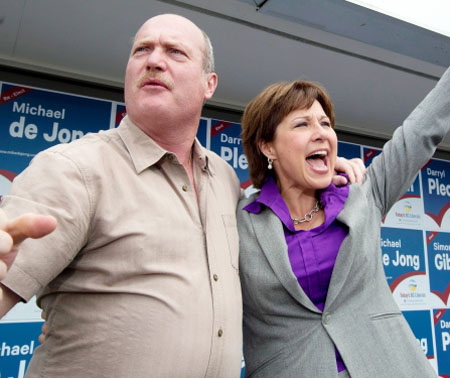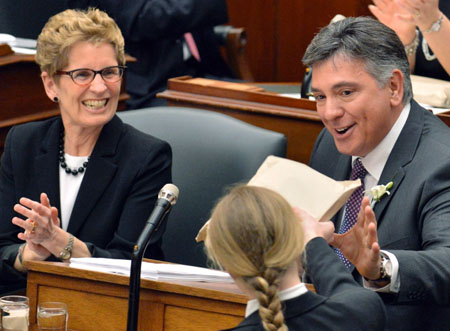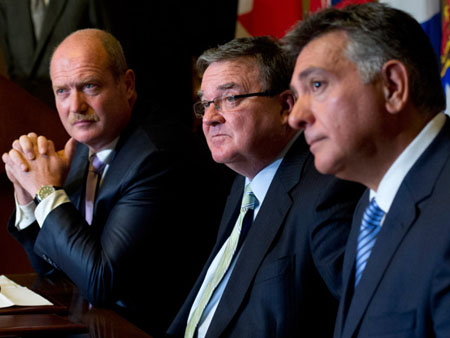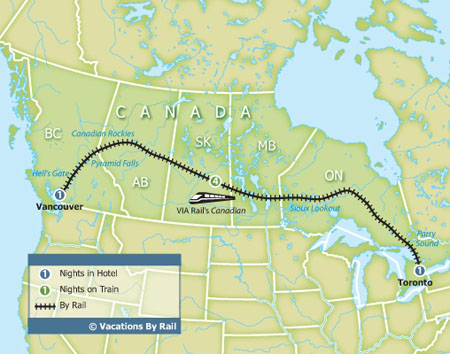The Cooperative Capital Markets Regulator in Canada .. three surprised cheers for Flaherty, Sousa, and de Jong
Sep 19th, 2013 | By Counterweights Editors | Category: Key Current IssuesWe are reluctant to give too much credit for anything to the Harper government in Ottawa (to say nothing of federal finance minister Jim Flaherty). But today’s surprising announcement that the “federal, Ontario and British Columbia governments … have agreed to establish a co-operative securities regulator” qualifies as an unavoidable exception to the rule.
As the Canadian Press report explains, the three governments have just “taken a first step towards what they hope will be a national body to oversee Canada’s investment industry.” There are still many details to be ironed out, and plans only call for the first step itself to be “in place by July 1, 2015.”

Mike de Jong and his premier on the campaign trail in BC this past spring. JONATHAN HAYWARD , THE CANADIAN PRESS.
Similarly, Mr. “Flaherty and his counterparts in BC and Ontario [Michael de Jong and Charles Sousa respectively] also invited all the provinces to join them.” But serious movement in this direction is almost certain to be slow at best. It may not even begin until after the initial co-operative experiment among Ottawa, Victoria, and Queen’s Park is up and running (hopefully) in the summer of 2015.
Alberta and especially Quebec – the strongest opponents of a cross-Canada securities or capital markets regulator in the past – may prove especially uninterested. Quebec, home of the Quebecois nation in a united Canada and not a province like the others, may finally require some co-operative securities regulator arrangement parallel to the present dynamic duo of the Canada Pension Plan and the (virtually identical but still separate) Quebec Pension Plan.
Yet at last a start has been made on a longstanding goal of Canadian public policy since the Second World War. (At the Ottawa press conference this morning Mr. Flaherty urged that failed efforts in this direction have been accumulating for some 70 years.)
It is important as well that the first-step co-operative regulator the three governments will be working on between now and the summer of 2015 will not be a strictly federal institution. As Mr. Flaherty has stressed, it will be a federal-provincial partnership with a two-headed management body – on which BC will be the provincial representative for the first two years.

Charles Sousa and his premier, as the provincial budget is introduced in the Ontario legislature this past spring.
The federal finance minister even alluded to the historic intergovernmental pension agreements of the 1960s in describing the co-operative securities regulator concept this past spring : “This is not a federal regulator. This would be a joint Canadian regulator – similar to the Canada Pension Plan – where the provinces and the federal government would delegate our jurisdictions.” (As the Supreme Court of Canada made clear in 2011, the federal government cannot do this by itself.)
A scheme of this sort ought to have some potential for ultimately attracting the participation of other provinces. Meanwhile, BC and Ontario together account for more than half the Canadian population, and, according to Ontario finance minister Sousa, “two-thirds of capital markets” coast to coast to coast.
Finally, the first-step co-operative regulator the three governments will be establishing between now and the summer of 2015 – apparently to be officially known as the Cooperative Capital Markets Regulator (CCMR) – is more or less obvious good news for the Canadian financial sector and the Canadian economy. (“Canada is still the only industrial country without a single national market watchdog. At present, there are 13 separate regulators in the country” – one for each of the 10 provinces and three territories.)

BC Finance Minister Mike de Jong (left), Canadian Minister of Finance Jim Flaherty and Ontario Finance Minister Charles Sousa (right) listen to a question following the signing of an agreement on securities regulation. Adrian Wyld/The Canadian Press.
It is also good news for those of us who worry about the increasing lack of progress on the still quite unfinished Canadian nation-building project – the latest phase of which might equally be said to have begun after the Second World War, with the Canadian Citizenship Act of 1947. With its new British monarchist and “royal” enthusiasms, the Harper government has even seemed to backtrack on past nation-building progress (like the Diefenbaker Conservatives who opposed the new Canadian maple leaf flag in the 1960s).
BC finance minister de Jong had some further encouraging things to say in this context at the end of this morning’s press conference in Ottawa – about how we in the Canadian provinces ought to be doing more things together nowadays.
On several metrics, it is true enough that this particular group of three amigos –Â Flaherty, Sousa, and de Jong – are strange bedfellows, as some have emphasized. And of course who really knows just how their venture will unfold over the next few years? As matters stand in the vast Canadian geography, however, we have no doubt at all that they deserve three cheers.


